
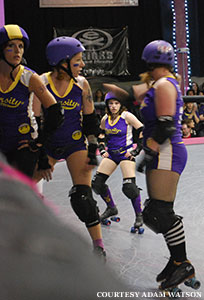
Forget everything you thought you knew about roller derby. This is not the sports entertainment version that was televised in the '70s and '80s with predetermined winners. The only proof you need is holding crutches and screaming from the bench on this April Saturday night. A skater named Lace N' Arsenic of the Varsity Brawlers broke her ankle on the track and has four inches of surgical stitches and a walking boot to show for it.
Roller derby leagues played on banked tracks -- as opposed to a more tame version on flat surfaces -- are sprouting up everywhere. Eleven are currently in use nationwide and five more are in development, including one in Brazil. And the crowds are coming out in droves, thrilled by fearless women with clever handles and impressive skills.
These ladies take roller derby very seriously. They practice four or five nights a week. "My life feels like it centers around this sport," says Skatum O'Neal of the Tough Cookies, who just kicked off their title defense in the L.A. Derby Dolls league. More than 150 skaters and volunteers, spread over five teams, make up the league. The only pay is bragging rights. The Dolls do it for the love of the sport. And for the fans.
The L.A. Derby Dolls were founded in 2003 and are currently in their third home, expanding each time to accommodate a quickly growing fan base. They now skate in a 50,000 square foot former ice cream cone factory in Historic Filipinotown, not far from Downtown Los Angeles. It holds nearly 2,000 screaming fans, and it sells out pretty much every game.
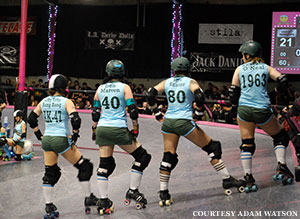
To call a night at the Doll Factory raucous fun doesn't do it justice. There are food trucks parked outside, selling everything from Hawaiian BBQ to sliders to hot dogs on sticks. Vendors hawking everything from clothing to makeup to energy drinks are in the Doll Mall, a giant space adjacent to the track. There's a band rocking out during the 30-minute halftime. But the real action takes place under a giant roller skate-shaped disco ball.
Fans pack standing-only risers in the general admission section. VIP tickets include open seating on a giant set of metal bleachers. There's a guy pushing a trash can full of Tecate around the outside of the track for those too lazy to walk the 50 feet to the nearest stand. And when the bout starts, the crowd goes nuts.
"There's an atmosphere on game night at the Doll Factory that's unlike anything else," Skatum O'Neal says.
It's half NASCAR, half mosh pit.

Each bout is broken up into four 15-minute quarters. Each quarter is filled with 60-second jams. The rules are easy to pick up: Five players start on the track for each team; 4 blockers and one jammer. A whistle sounds and the pack of blockers takes off. A second whistle starts the jammers, who try to make their way through the pack. Only the jammers can score, and they do so every time they lap an opposing player. A jam ends after one minute or when the lead jammer places her hands on her hips.
To be sure, there is plenty of skill involved. The Dolls have to use teamwork, their skating abilities and their bodies to block. They cannot use their hands or elbows, and there's no shoving or tripping, either. Doing any of these acts, or similar offenses, is a penalty which results in points for the opposition and possibly a power play. The jams are tightly monitored by referees, but the zebras aren't exactly buttoned up. They have derby names too, like Charlie Frown and Thomas Refferson.
This particular Saturday night seemed like it was going to be a walk in the park for the Tough Cookies. Two of their jammers, Jackie Nimble and Gori Spelling, helped them out to an early 11-point lead. The crowd was loving the favorites and cheering on what looked to be a blowout over the upstart Brawlers. As the Dolls flew around the track, the fans made the ground shake.
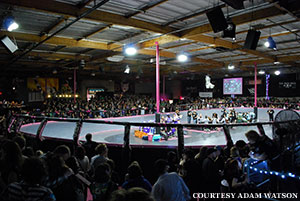
Skatum O'Neal used to be one of them. She was Jessica McGovern back then.
"I was instantly in love with it and wanted to do it," McGovern says of attending her first bout three years ago. "I think I'd been missing something in my life, some sort of extracurricular activity."
By day, McGovern is an assistant television editor. When she first saw the Dolls, she hadn't been on skates in about 15 years. She wasn't a thrill seeker, but she had always been into team sports. All it took was watching that first game and she was hooked.
Laci Knight had the same experience. She came to her first bout in November 2008, and it wouldn't be long before she joined and got to come up with a derby name of her own: Lace N' Arsenic. But unlike McGovern, Knight was all about adventure before she found the Dolls. She had been bungee jumping and still wants to go sky diving. By day, she's a contract administrator, but the rest of her time is all about grabbing life by the horns. (Or in this case, the crutches.)
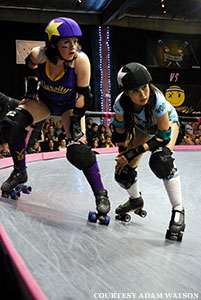
Two hours before tonight's game, McGovern and Knight were wrapped up in a friendly bear hug. Now Skatum O'Neal is trying to keep the Brawlers' jammer on her back hip while Lace N' Arsenic is screaming directions from one foot. And it's working. The underdogs take a 72-39 lead over the defending champion Tough Cookies at the half.
Roller Derby is evolving. The Dolls might play on a track that was built by the skaters, their friends and family, but there is nothing amateur about their preparation. Lace N' Arsenic is actually one of the trainers. In the past, she helped mold the "fresh meat." Now she just focuses on skilling the Brawlers.
There are different levels of classes that anyone can sign up for at the Doll Factory. The curious can take one-time instruction while wannabe Dolls go through intensive training and pay their dues helping out on game nights. There's even a junior class for girls ages 8 to 17.
"The level of athleticism has stepped up so much just since I've started," Skatum says.
The jammers are getting faster and the sport is attracting a new class of athletes. But with that comes increased risk.
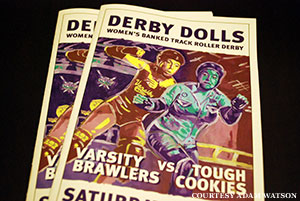
"My mom is always telling me not to get hurt," Lace N' Arsenic says. "But I can't tell her I won't."
Not anymore she can't. On her 30th birthday, in the last few minutes of practice, Lace fell awkwardly and broke her ankle. It meant three months off skates for the Brawlers co-Captain. She won't even be able to scrimmage until after the summer.
For now, she can only cheer on her team. The Tough Cookies have come roaring back. They've dominated the past three years and aren't giving up their first home bout of the season without a fight. Their jammers have been on a tear. It's late in the fourth quarter and the Brawlers lead has been slashed. It's 123-107 with just under four minutes to go.
Roller Derby went through a revival about a decade ago. All the staged antics were thrown out the window and the sport was rebuilt. You can call it punk or feminist. There are certainly elements of each: Mohawks; ripped fishnets; tattoos and piercings. You can call it cult. But don't call it underground.
The word is definitely spreading in Southern California, with Derby Dolls' teams in Los Angeles and San Diego, but the sport is more widespread than a lot of people know.

"It's so much bigger than just here," Skatum O'Neal says. "There are leagues all over the country and in other countries."
Hundreds of leagues actually, from Austin to Hilo.
"We're trying to branch the sport out," Lace says. "We all want this to become a professional sport one day."
And it could be. The games are intense and fiercely competitive. The upset blowout that the halftime score predicted has all but vanished. The Cookies have cut the Brawlers' lead to three with just over a minute remaining.
Before the bout, Dolls from both sides said the outcome of this game would be a good indication of how the entire season would go. If that's the case, roller derby is sure to keep growing.
The ending was electric.




